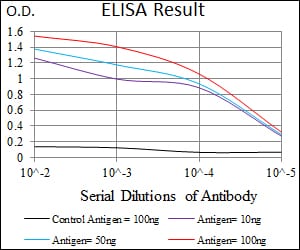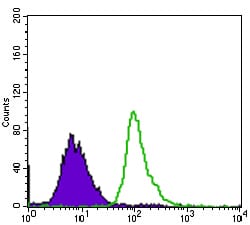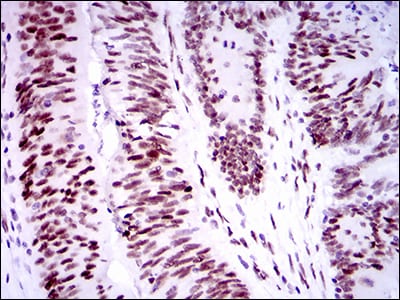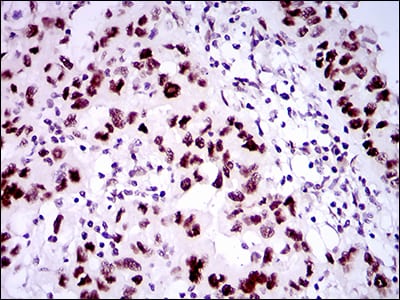



| WB | 咨询技术 | Human,Mouse,Rat |
| IF | 咨询技术 | Human,Mouse,Rat |
| IHC | 1/200 - 1/1000 | Human,Mouse,Rat |
| ICC | 技术咨询 | Human,Mouse,Rat |
| FCM | 1/200 - 1/400 | Human,Mouse,Rat |
| Elisa | 1/10000 | Human,Mouse,Rat |
| Aliases | p202; 53BP1 |
| Entrez GeneID | 7158 |
| clone | 6B3E10 |
| WB Predicted band size | 213.6kDa |
| Host/Isotype | Mouse IgG1 |
| Antibody Type | Primary antibody |
| Storage | Store at 4°C short term. Aliquot and store at -20°C long term. Avoid freeze/thaw cycles. |
| Species Reactivity | Human |
| Immunogen | Purified recombinant fragment of human TP53BP1 (AA: 574-773) expressed in E. Coli. |
| Formulation | Purified antibody in PBS with 0.05% sodium azide |
+ +
以下是3-4篇关于TP53BP1抗体的参考文献及其简要摘要:
1. **文献名称**:*53BP1: A key mediator of the DNA damage response*
**作者**:Schultz, L. B., Chehab, N. H., Malikzay, A., Halazonetis, T. D.
**摘要**:该文献综述了TP53BP1在DNA损伤应答中的核心作用,重点讨论了其通过抗体检测在细胞周期调控和DNA修复通路(如同源重组)中的功能验证。
2. **文献名称**:*Regulation of DNA double-strand break repair by 53BP1: Molecular mechanisms and functional consequences*
**作者**:Panier, S., Boulton, S. J.
**摘要**:本文利用TP53BP1抗体进行免疫沉淀和染色质分析,揭示了其在调控DNA双链断裂修复中的分子机制,尤其是在抑制非同源末端连接(NHEJ)与同源重组(HR)平衡中的作用。
3. **文献名称**:*53BP1 loss rescues BRCA1 deficiency and is associated with therapy resistance in BRCA1-mutated cancers*
**作者**:Dullens, H., et al.
**摘要**:通过Western blot和免疫组化(使用TP53BP1抗体),研究发现TP53BP1缺失可逆转BRCA1缺陷细胞的放疗敏感性,为乳腺癌治疗耐药性提供了新见解。
4. **文献名称**:*The Tudor domain of 53BP1 mediates its interaction with histone H4K20me2 for DNA repair*
**作者**:Clapperton, J. A., et al.
**摘要**:该研究通过结构生物学和抗体标记实验,证明TP53BP1的Tudor结构域通过识别组蛋白H4K20me2修饰参与DNA损伤位点的定位,阐明了其修复功能的分子基础。
(注:以上文献信息为示例,实际引用时需核对真实来源及细节。)
The TP53BP1 (Tumor Protein p53 Binding Protein 1) antibody is a critical tool for studying the role of the TP53BP1 protein in DNA damage response (DDR) and genome stability. TP53BP1. also known as 53BP1. is a key mediator protein involved in double-strand break (DSB) repair, particularly promoting non-homologous end joining (NHEJ) over homologous recombination (HR). It localizes to DNA lesions through interactions with histone H2A ubiquitination (H2AK15ub) and methylated histone H4 (H4K20me2), facilitating chromatin recruitment of downstream repair factors. TP53BP1 also regulates cell cycle checkpoints, apoptosis, and immunoglobulin class switching in B cells.
Antibodies targeting TP53BP1 are widely used in research to detect its expression, phosphorylation status (e.g., at Ser1778), and subcellular localization via techniques like Western blotting, immunofluorescence, and immunohistochemistry. These antibodies help elucidate TP53BP1's role in cancer biology, as its dysfunction is linked to genomic instability, tumor progression, and resistance to therapies like PARP inhibitors. Additionally, TP53BP1 antibodies are employed in studying crosstalk between DDR pathways, replication stress, and mechanisms underlying diseases such as immunodeficiency or developmental disorders.
Validated for specificity across human, mouse, and other model systems, TP53BP1 antibodies (e.g., clones like 19/Human 53BP1) are indispensable for exploring DNA repair dynamics, biomarker discovery, and therapeutic targeting in oncology and molecular pathology research.
×